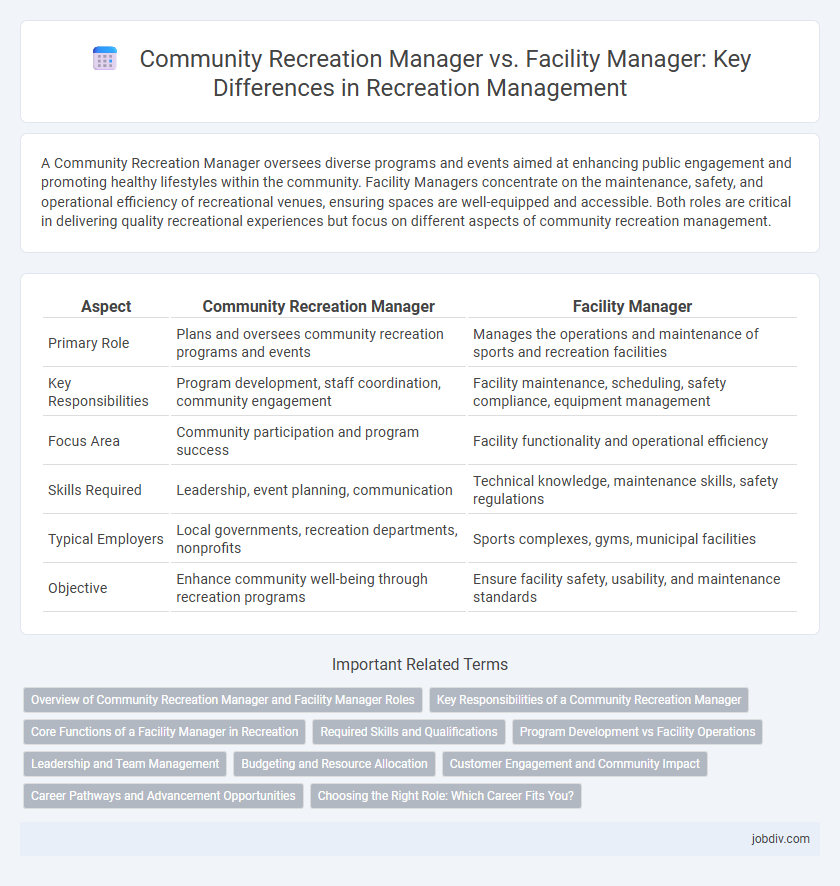A Community Recreation Manager oversees diverse programs and events aimed at enhancing public engagement and promoting healthy lifestyles within the community. Facility Managers concentrate on the maintenance, safety, and operational efficiency of recreational venues, ensuring spaces are well-equipped and accessible. Both roles are critical in delivering quality recreational experiences but focus on different aspects of community recreation management.
Table of Comparison
| Aspect | Community Recreation Manager | Facility Manager |
|---|---|---|
| Primary Role | Plans and oversees community recreation programs and events | Manages the operations and maintenance of sports and recreation facilities |
| Key Responsibilities | Program development, staff coordination, community engagement | Facility maintenance, scheduling, safety compliance, equipment management |
| Focus Area | Community participation and program success | Facility functionality and operational efficiency |
| Skills Required | Leadership, event planning, communication | Technical knowledge, maintenance skills, safety regulations |
| Typical Employers | Local governments, recreation departments, nonprofits | Sports complexes, gyms, municipal facilities |
| Objective | Enhance community well-being through recreation programs | Ensure facility safety, usability, and maintenance standards |
Overview of Community Recreation Manager and Facility Manager Roles
Community Recreation Managers oversee the planning, coordination, and promotion of recreational programs and activities designed to enhance community engagement and well-being. Facility Managers focus on the maintenance, safety, and operational efficiency of recreational centers, ensuring that facilities meet regulatory standards and user needs. Both roles require strong leadership and communication skills but differ in scope, with Community Recreation Managers emphasizing program development and Facility Managers prioritizing infrastructure management.
Key Responsibilities of a Community Recreation Manager
A Community Recreation Manager oversees the development and implementation of diverse recreational programs tailored to community needs, ensuring accessibility and inclusivity. They coordinate with local organizations, manage budgets, and lead outreach efforts to foster community engagement and enhance public wellness. Unlike Facility Managers who focus on maintenance and operations, Community Recreation Managers prioritize program planning and community relationship building.
Core Functions of a Facility Manager in Recreation
Facility Managers in recreation oversee day-to-day operations, ensuring safety compliance, maintenance, and efficient scheduling of recreational spaces. They coordinate equipment management, staff supervision, and facility upkeep to maximize user satisfaction and operational effectiveness. Core functions also include budget management, vendor relations, and implementing health protocols to create an optimal recreational environment.
Required Skills and Qualifications
Community Recreation Managers require strong leadership abilities, excellent communication skills, and expertise in program development, often holding a bachelor's degree in recreation management or related fields. Facility Managers prioritize technical knowledge in facility operations, maintenance, budgeting, and safety compliance, typically needing certifications such as Certified Facility Manager (CFM). Both roles demand proficiency in staff supervision and customer service, but Community Recreation Managers emphasize community engagement while Facility Managers focus on operational efficiency.
Program Development vs Facility Operations
Community Recreation Managers specialize in program development, designing and implementing diverse recreational activities that meet community needs and enhance participation. Facility Managers concentrate on facility operations, ensuring the maintenance, safety, and efficient use of recreational spaces and equipment. Both roles are essential; program development fosters community engagement while facility operations guarantee a safe and functional environment.
Leadership and Team Management
A Community Recreation Manager leads diverse teams to develop inclusive programming that fosters social engagement and community wellness, emphasizing strategic collaboration and stakeholder communication. Facility Managers focus on operational leadership, ensuring maintenance teams and staff optimize facility safety, functionality, and user satisfaction. Effective team management in both roles requires adaptable leadership styles tailored to dynamic environments and the specific goals of community recreation or facility operations.
Budgeting and Resource Allocation
Community Recreation Managers oversee budgeting by allocating funds to diverse programs, ensuring inclusive access and maximizing community engagement. Facility Managers focus budgets on maintenance, equipment upgrades, and operational costs to maintain safety and efficiency within recreation centers. Both roles require strategic resource allocation, but Community Recreation Managers prioritize program diversity while Facility Managers emphasize infrastructure sustainability.
Customer Engagement and Community Impact
Community Recreation Managers prioritize customer engagement by designing inclusive programs that foster social connections and promote wellness among diverse populations. Facility Managers focus on maintaining safe, accessible environments that support various recreational activities while enhancing user experience through efficient operations. Both roles significantly impact community well-being, with Recreation Managers driving active participation and Facility Managers ensuring quality infrastructure for sustained engagement.
Career Pathways and Advancement Opportunities
Community Recreation Managers typically advance by gaining experience in program development, community engagement, and managing diverse recreational services, positioning them for leadership roles within municipal or nonprofit organizations. Facility Managers often progress through focused expertise in operational management, maintenance oversight, and safety compliance of recreational centers, moving toward senior roles in facility administration or corporate management. Both career paths offer advancement opportunities, with Community Recreation Managers leaning toward strategic planning and public relations, while Facility Managers emphasize technical proficiency and infrastructure management.
Choosing the Right Role: Which Career Fits You?
Community Recreation Managers oversee program development, community engagement, and resource allocation to enhance public well-being through recreational activities. Facility Managers focus on the maintenance, safety, and operational efficiency of recreation centers, gyms, or sports complexes. Selecting the right career depends on whether you prefer strategic leadership in community programs or hands-on management of recreational facilities.
Community Recreation Manager vs Facility Manager Infographic

 jobdiv.com
jobdiv.com